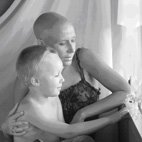Latest News

Hi. I’m Chris Walsh and I live at Waitarere Beach, a small village between Levin and Foxton. My partner Sue and I have a beautiful black Labrador called JJ and two cats that control activities in the house but still refuse to do housework. I work at Victoria University in Wellington and this year graduated with a Doctor of Philosophy in Nursing.

My name is Nicola Russell - I'm 35, and I immigrated to New Zealand in 1997 from the shores of Carlingford Lough in Ireland.

Kia ora, Boogie to my friends, Belinda to everyone else. I’m 34 years old with a 16 month old son to my partner Bryce. The three of us live in the Kapiti Coast area – where life by the sea couldn’t be any better. We recently moved out of Wellington City in search of what we all dream about, work/life balance. So far so good, I blame it on the sea breeze and the view of Kapiti Island from our beachfront property.
Herceptin and HER2-positive breast cancer
Herceptin is a targeted therapy for HER2-positive breast cancer.
HER2 stands for human epidermal growth factor 2, a protein located on the surfaces of cells involved in controlling cell proliferation. Breast cancer tumours that have higher-than-normal levels of HER2 are said to be ‘over-expressing’ this protein, and are referred to as HER2 positive. About 23% of breast cancers are HER2 positive.
Herceptin (generic name: trastuzumab) is a drug designed to lock onto and shut down the HER2 protein. Its molecular structure is based on an antibody that can precisely target the HER2 protein. Herceptin is a ‘biological drug’; it is manufactured using laboratory-cultured cells.
Breast cancer survivor and advocate honoured
The Breast Cancer Aotearoa Coalition is thrilled its chairperson, Elisabeth Burgess (Libby), has been recognised in the 2011 New Year’s Honours.
Ms Burgess has become a Member of the New Zealand Order of Merit for her work with women, their families and communities affected by breast cancer.
The Coalition’s deputy chair, Dr Chris Walsh, says the award is well-deserved.
“This recognises Libby’s passion, dedication and determination to improve the lives of women with breast cancer.
“She has been a tireless advocate for a world-class health system in New Zealand which offers the best detection and treatment of breast cancer available.
About 20% of the 3300 New Zealanders diagnosed with breast cancer each year will have HER2-positive breast cancer.
HER2 stands for 'human epidermal growth factor receptor-type 2'. It is a type of protein that sits on the surface of all normal cells and its job is to send messages to the cell, telling it to grow and replicate.
BCAC is delighted that Palmerston North oncologist, Dr Richard Isaacs, (pictured) has been acknowledged in the Queen’s Birthday honours as a Member of the New Zealand Order of Merit.
Dr Isaacs was instrumental in the battle to secure Government funding for a 12-month treatment programme of Herceptin for women with HER2 Positive breast cancer.
He’s been honoured for his contribution to ensuring cancer patients have access to world-class treatment, as well as his contributions to research and breast cancer care.
BCAC chairperson, Libby Burgess, says Dr Isaacs' award is well deserved.
BCAC is mourning the passing of its former Treasurer, Sue Guthrie, who recently lost her battle with breast cancer.
Sue was only 47 when she died on November 11 2009, but she lived with courage, serenity and dignity to the end.
Says BCAC chairperson, Libby Burgess, “Sue was an inspiration to all who knew her for the way she lived her life and the way she faced her death.
“She was committed to making a positive difference for all those who faced breast cancer and maintained this passion and dedication even as her own health worsened.”



